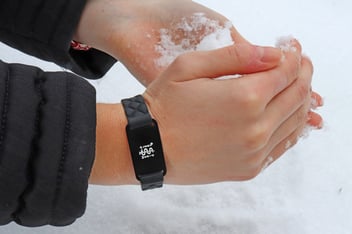60 Years of Saving Lives: Leslie’s Story

The year was 1981. For the first time, gas was sold in litres rather than gallons, Canada was awarded the 1988 Winter Olympics, and the 83-kilometre section of the Trans-Canada Highway where Terry Fox was forced to end his run was renamed in his honour.
1981 was also the year Leslie had a severe reaction to a medication she’d been prescribed for an ear infection. She had a seizure and was left temporarily blind in the hospital for a week.
While it wasn’t Leslie’s first major health challenge, it was the year she became a MedicAlert subscriber.
In fact, 10 years earlier, in 1971 after a case of the measles, Leslie developed encephalitis and ended up in a coma for six weeks. Encephalitis can occur in children, either during or after a measles infection. It is the result of the brain becoming infected with the virus during the rash phase of the illness or by an immune-mediated brain inflammation subsequent to measles infection. It happens to about one in every 1,000 children who have the measles.
Leslie could have ended up with an incurable form of dementia known as subacute sclerosing panencephalitis (SSPE), a complication of the measles. Instead, what happened to Leslie was an allergic reaction to the measles virus several weeks after her infection. This is called acute disseminated encephalomyelitis (ADEM). Children seem to recover, then get fever, confusion, headaches, and neck stiffness. Like SSPE and measles encephalitis, ADEM occurs in about one out of 1,000 cases of measles. It is fatal in 10% to 20% of patients. Survivors of measles encephalitis and ADEM often have epilepsy, brain damage, or developmental delay. Leslie was one of the lucky ones. She suffered no significant after effects other than the occasional seizure.
But it was this experience that introduced Leslie’s mother to MedicAlert, which was recommended at the time by her doctor, a specialist in the emerging field of Psychobiology, which we now know as neuroscience/neurology.
Leslie’s seizure at the time of her drug interaction was the first one that had happened since she was a little girl. It was this frightening experience coupled with the drug interaction that led to a serious conversation between Leslie and her mother. It was time for MedicAlert.
“I have no recollection of what happened to me when I was a little girl, but I still vividly remember the medication interaction and losing my vision while I was behind the sales counter at work,” she says. “It was terrifying. I had no idea what was happening, or why, and I scared my work colleague when I had the seizure.”
Since then Leslie’s had three seizures, but her MedicAlert ID was helpful each time. “I’m grateful for the information my ID and my health information in the Subscriber Health Information Database makes available to first responders and healthcare professionals,” she says. “I am also proof that MedicAlert is a valuable, lifesaving service for people in emergency health situations.”
Today, Leslie does more than wear a MedicAlert ID. In 2020, she became MedicAlert’s CEO.
“I’m not certain if you had asked me when I was 16 if I knew I was destined to become the CEO of this iconic Canadian charity,” she says. “But I can definitely tell you that when the opportunity arose to put my hat in the ring, I did not hesitate. MedicAlert is an important part of the Canadian healthcare fabric. For me and more than one-million Canadians who rely on the service, there is simply a peace of mind that comes with being a subscriber.”



